The Art of Pain
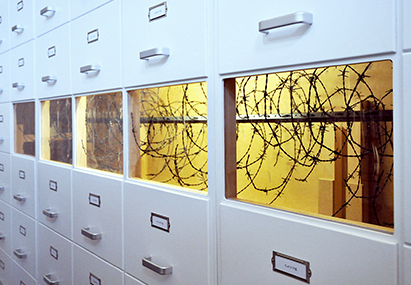 |
Tues 21 and Wed 22 July 2015
|
The Bob Hawke Prime Ministerial Centre, Pain Adelaide and the Australian Network for Art & Technology (ANAT) present The Art of Pain, an exhibition, keynote lecture and panel discussions about the experience and management of chronic pain.
Keynote Address: Whiplash – Current Concepts and Future Directions
Professor Michele Sterling in conversation with Professor Lorimer Moseley
Click image below to access YouTube video
Proudly supported by the Motor Accident Commission, and in conjunction with the Art of Pain, this evening lecture will focus on whiplash and low back pain.
Professor Sterling is one of the most important experts internationally on neck pain sustained after car accidents. In this evening lecture, Professor Sterling will provide an overview of what is what, what is hot and what is not, in the prevention and management of whiplash associated disorders.
Her lecture will be followed by a more interactive session in which she and Professor Moseley will discuss some of the more perplexing aspects of neck pain and there will be time for questions from the floor.
Morphine and Mindfulness - same room, different windows?
With Professor Mark Hutchinson, Dr Tim Semple, Georgie Davidson and Dr George Khut - Facilitated by Professor Lorimer Moseley
Wednesday 22 July 2015
Click image below to access YouTube video
Morphine-type drugs, called opiates, are commonly prescribed for chronic pain, but they tend to make news headlines for the wrong reasons – addiction, tolerance, accidental overdose. Professor Mark Hutchinson is a world authority on the interactions that opioids have with our brain (nervous system) and "other brain" (central immune system). Mark will explain how these drugs can be so helpful but also problematic and how the opioids we make in our very own ‘drug cabinet in the brain’ might be similar to, and different from, those we can take in a pill or injection.
Dr Tim Semple from the RAH will provide a ‘prescriber’s’ perspective. Tim is a Pain Medicine Specialist and Deputy Head of the RAH Pain Unit. Tim will discuss the use of opioids and mindfulness from his perspective running a public hospital pain clinic. Another hot topic at the moment is the therapeutic technique of mindfulness – even the TV star are getting into that. Georgie Davidson is a physiotherapist, yoga teacher and mindfulness practitioner. She blends her diverse and complimentary skill sets to help people in pain. Georgie will discuss the use of mindfulness in the real world, both as part of clinical practice and as a way of life.
The panel will wrap with a presentation of an applied mindfulness tool, BrightHearts, developed by The Art of Pain exhibiting artist George Poonkhin Khut and staff specialist, Dr Angie Morrow from the Children’s Hospital Westmead.
Playing Tricks With The Mind – Illusion and its affect
With Dr Valeria Bellan, Eugenie Lee and Cat Jones
Click image below to access YouTube video)
Join research fellow Dr Valeria Bellan as she discusses how the processing of tactile and painful stimuli informs multisensory integration and body representation – and in particular how our understanding of our peripersonal space informs our experience of pain. Valeria will be joined by two of The Art of Pain exhibiting artists, Cat Jones and Eugenie Lee, who have both worked alongside her and other researchers at Body in Mind to test how artistic tools and processes concerned with illusion can contribute to this research.
Image credit: McGill Pain Questionnaire (detail) 2012, photo by Eugenie Lee
|
|
|
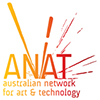 |
Presented by The Bob Hawke Prime Ministerial Centre, Pain Adelaide and the Australian Network for Art and Technology
ANAT is assisted by the Australian Government through the Australia Council for the Arts and by the South Australian Government through Arts SA
Eugenie Lee was assisted by an Amplify Your Art grant administered by Accessible Arts on behalf of the NSW Government
Event Series Presenters
Professor Michele Sterling is the Director of the NHMRC Centre of Research Excellence in Recovery Following Road Traffic Injuries and Associate Director of the Centre of National Research on Disability and Rehabilitation Medicine (CONROD).
She is Professor in the Centre of Musculoskeletal Research and the School of Allied Health and a NHMRC Senior Research Fellow. She has a discipline background as a musculoskeletal physiotherapist and is a Fellow of the Australian College of Physiotherapists.
Her main focuses of research are: the physiological and psychological factors underlying musculoskeletal pain and injury; the prediction of outcome following whiplash injury and the clinical translation of research findings to clinical practice. She is a member of the Editorial Board of PLos One and is Associate Editor of the European Journal of Physiotherapy. Michele is Chair of the Scientific Committee of the Australian Pain Society.
Professor Lorimer Moseley is a clinical scientist investigating pain in humans. After posts at The University of Oxford, UK, and the University of Sydney, Lorimer was appointed Foundation Professor of Neuroscience and Chair in Physiotherapy, The Sansom Institute for Health Research at the University of South Australia. He is also Senior Principal Research Fellow at NeuRA and an NHMRC Principal Research Fellow.
He consults to governmental and industry bodies in Europe and North America on pain-related issues. He was awarded the inaugural Ulf Lindblom Award for the outstanding mid-career clinical scientist working in a pain-related field by the International Association for the Study of Pain, was shortlisted for the 2011 and 2012 Australian Science Minister’s Prize for Life Sciences, and won the 2013 Marshall & Warren Award from the NHMRC, for the Best Innovative and Potentially Transformative Project. He was made Fellow of the Australian College of Physiotherapists in 2011, by original contribution, and an Honoured Member of the Australian Physiotherapy Association, their highest honour, in 2014.
Professor Hutchinson is an ARC Australian Research Fellow and is the Director of the ARC Centre of Excellence for Nanoscale BioPhotonics (CNBP). He is also a Professor within the School of Medical Sciences at the University of Adelaide.
Professor Hutchinson returned to the University of Adelaide in 2009 as an NHMRC CJ Martin Research Fellow, and established the Neuroimmunopharmacology research laboratory. From 2005 to 2009 Mark worked in the world leading laboratory of Prof Linda Watkins in the Center for Neuroscience at the University of Colorado at Boulder. Here he pioneered with Prof Watkins the research which has led to the discovery of novel drug activity at innate immune receptors.
Mark’s research has implicated the brain immune-like cells in the action of drugs of dependence and the negative side effects of pain treatments. His work has enabled the translation of compounds at the lab bench to clinical agents used at the bedside.
He is now added Director of the CNBP to his roles. The CNBP is an ARC Centre of Excellence with $38M of funding committed for 7 years, headquartered at The University of Adelaide, with nodes at Macquarie University, Sydney and the RMIT, Melbourne. We are partnered with universities and companies in Europe, the US and China, as well as other Australian institutions.
The CNBP has a mission to "Discover new approaches to measure nano-scale dynamic phenomena in living systems".
 Georgie is a musculoskeletal physiotherapist, yoga and mindfulness teacher. She provides embodied and experiential training that brings research findings into the clinical setting to assist people with physical and emotional pain to heal and thrive. She has extensive training and experience in teaching the evidence-based MBSR (Mindfulness Based Stress Reduction) course developed by Jon Kabat-Zinn at the University of Massachusetts.
Georgie is a musculoskeletal physiotherapist, yoga and mindfulness teacher. She provides embodied and experiential training that brings research findings into the clinical setting to assist people with physical and emotional pain to heal and thrive. She has extensive training and experience in teaching the evidence-based MBSR (Mindfulness Based Stress Reduction) course developed by Jon Kabat-Zinn at the University of Massachusetts.
Georgie has an interest in the neurological links between trauma and pain and in 2014 was involved with research at the Repatriation Hospital assessing yoga as an adjunct treatment for PTSD in veterans. Georgie aims to be a part of a shift towards creating societies that foster health and wellbeing through sharing mindfulness-based practices with healthcare providers. Recent projects include Mindfulness Life Skills for Paramedic students (Flinders University), Preventing Chronicity for Physiotherapists (supported by WorkCover SA’s RTW fund) and Working with Pain and Illness: A Mindful Approach for Counsellors. She will offer the course Positive Neuroplasticity by Neuropsychologist Dr Rick Hanson, to South Australians in 2016.
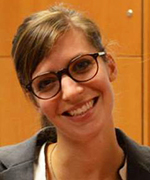 Valeria obtained her degree in Cognitive and Neuro Psychology at the University of Pavia, Italy. Since then she has finished her PhD (entitled ‘Body representation, body localisation and body size perception: a study of bodily modulations’) at the University of Milano-Bicocca under the supervision of Dr Alberto Gallace and now is with the BiM team at the University of South Australia as a post doc fellow. Valeria’s work investigates the processing of tactile and painful stimuli in the context of multisensory integration and body representation. In particular, Valeria uses the Mirage box to perform bodily illusions in order to investigate self-localisation as in some painful conditions the organisation of peripersonal space has been found to be extremely relevant.
Valeria obtained her degree in Cognitive and Neuro Psychology at the University of Pavia, Italy. Since then she has finished her PhD (entitled ‘Body representation, body localisation and body size perception: a study of bodily modulations’) at the University of Milano-Bicocca under the supervision of Dr Alberto Gallace and now is with the BiM team at the University of South Australia as a post doc fellow. Valeria’s work investigates the processing of tactile and painful stimuli in the context of multisensory integration and body representation. In particular, Valeria uses the Mirage box to perform bodily illusions in order to investigate self-localisation as in some painful conditions the organisation of peripersonal space has been found to be extremely relevant.
While the views presented by speakers within the Hawke Centre public program are their own and are not necessarily those of either the University of South Australia or The Hawke Centre, they are presented in the interest of open debate and discussion in the community and reflect our themes of: strengthening our democracy - valuing our diversity - and building our future.
The copying and reproduction of any transcripts within the Hawke Centre public program is strictly forbidden without prior arrangements.







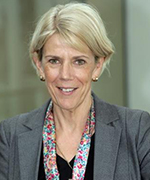 Professor Michele
Professor Michele 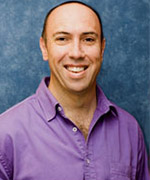 Professor Lorimer
Professor Lorimer 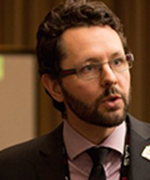 Mark
Mark